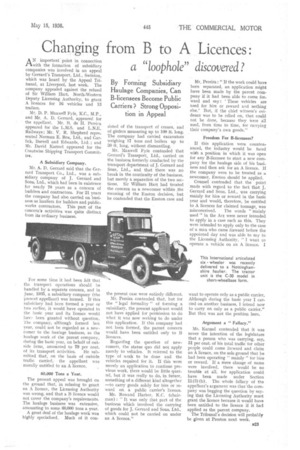from B to A Licences:
Page 41

If you've noticed an error in this article please click here to report it so we can fix it.
a "loophole" discovered?
By Forming Subsidiary Haulage Companies, Can B-licensees Become Public Carriers ? Strong Opposi tion in Appeal
sisted of the transport of cranes, and of girders measuring up to 100 ft. long. The company had carried excavators weighing 17 tons and boilers up to 30 ft. long, without dismantling.
Mr. Maxwell Fyfe contended that Gerrard's Transport, Ltd., carried on the business formerly conducted by the transport department of J. Gerrard and Sons, Ltd., and that there was no break in the continuity of the business, but merely a separation of the two sections. Sir William Hart had treated the concern as a newcomer within ;the meaning of the Enston decision, but he contended that the Enston case and the present case were entirely different.
Mr. Pereira contended that, but for the legal formality " of forming a subsidiary, the present applicant would not have applied for permission to do what it was now seeking to do under this application. If this company had not been formed, the parent concern would have been entitled only to B licences.
Regarding the question of newcomers, the status quo did not apply merely to vehicles. It referred to the type of work to he done and the vehicles required for it. If this were merely an application to continue previous work, there would be little quarrel, but it was really to do, in future, something of a different kind altogether —to carry goods solely for hire or reward on a public carrier's licence.
Mr. Rowand Harker, K.C. (chairman) : "It was only that part of the business which involved the carrying of goods for J. Gerrard and Sons, Ltd., which could not be carried on under an A licence." Mr. Pereira: " If the work could have been separated, an application might have been made by the parent company if it had been able to come forward and say: 'These vehicles are used for hire or reward and nothing else.' But, if the chief witness's evidence was to be relied on, that could not be done, because they tvere all used, from time to time, for carrying their company's own goods."
Freedom For B-licensees?
If this application were countenanced, the industry would be faced with a position in which it was open for any B-licensee to start a new company for the haulage side of his business and then ask for an A licence. If the company were to be treated as a newcomer, Enston should be applied.
Counsel contended that the point made with regard to the fact that J. Gerrard and Sons, Ltd., was carrying mainly for hire or reward in the basic year and would, therefore, be entitled to A licences for claimed tonnage, was misconceived. The words "mainly used" in the Act were never intended to apply in a case such as this. They were intended to apply only to the case of a man who came forward before the appointed day and was able to say to the Licensing Authority, " I want to operate a vehicle on an A licence. I want to operate only as a public carrier. Although during the basic year I carried on another business, I intend now to carry on only as a public carrier." But that was not the position here.
Argument a " Fallacy."
Mr. Karmel contended that it was never the intention of the legislature that a person who was carrying, say, 51 per cent. of his total traffic for other people could come forward and claim an A licence, on the sole ground that he had been operating " mainly " for hire or reward. If a mere change of name were involved, there would be no trouble at all, for application could have been made under Section 11(3) (b). The whole fallacy of the appellant's argument was that the company was begging the question by saying that the Licensing Authority must grant the licence because it would have been entitled to the licence if it had applied as the parent company.
The Tribunal's decision will probably be given at Preston next week.




































































































